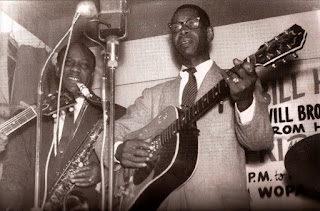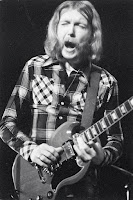 |
| Robert Johnson |
It is commonly said that you trace the history of the slide guitar back through three artists: Duane Allman>Elmore James>Robert Johnson. Each was a monster on their instrument and learned from and built upon their predecessor. Robert Johnson's status as "King of the Delta Blues" is legendary, if not mythical. The Mississippi musician's influence is likely unmatched in popular music - later blues giants such as Muddy Waters and Howlin' Wolf were directly influenced by him, which would go on to influence the next generation of rock musicians such as Keith Richards, Jimi Hendrix, and Eric Clapton. Many people have never heard Robert Johnson's records, but they know his songs - "Crossroads Blues", "Dust My Broom", "Come On In My Kitchen", "Sweet Home Chicago", "Love In Vain". Robert Johnson famously and mysteriously died young at the age of 27, never knowing his full influence.
 |
| Elmore James |
A few years later, a World War II vet and Robert Johnson fan (and fellow Mississippian) named Elmore James incorporated Johnson's slide technique and sound into his own music. James would often play through a well-amplified hollow body acoustic, giving him a rich, dirty sound, especially when gliding or trilling his slide up and down the guitar neck. James' music was dirty barrel house blues - a heavy beat, a stinging guitar, and often a saxophone. He took Robert Johnson's lonesome acoustic blues and made it shake and dance with hits like "Shake Your Money Maker", "The Sky is Crying", "One Way Out" and even scoring a huge hit out of Johnson's own "Dust My Broom". Like Robert Johnson, he never lived to see his influence, struck down by a heart attack in 1963 at the age of 45.
 |
| Duane Allman |
After his death, Elmore James' legend only grew. "Dust My Broom" and "The Sky is Crying" would become blues standards, achieving immortality through covers by Taj Mahal, Stevie Ray Vaughn, Bonnie Raitt, Warren Haynes, John Hammond, Canned Heat, Ike & Tina Turner, Albert King, ZZ Top, Etta James, and countless other. Meanwhile, slide guitar master and Elmore James fan, Duane Allman, would pick a more obscure cut, "Done Somebody Wrong", as a showcase for his own slide playing. Where Elmore James plugged in Robert Johnson's music and made it dance, Duane Allman made it sing as he effortlessly created dynamic melodies using a glass pill bottle on a Gibson SG. Elmore James' "Done Somebody Wrong" was a foot stomper, but the Allman Brothers, as they did with so many of their covers, made the song swing. The Allmans first released the road-tested "Done Somebody Wrong" on
At Fillmore East in 1971 and it stayed in the band's rotation up until their final shows in 2014 (their final show featured James' "The Sky is Crying"). Duane Allman, of course, never lived to see his own influence. He died months after
At Fillmore East was released at the age of 24.
 |
| Derek Trucks |
These days former Allman Brothers guitarist, Derek Trucks, keeps the song alive with an acoustic version with his own band, The Tedeschi Trucks Band, which returns the song to its barrel house, foot stomping Elmore James roots. I took that as a starting point, but I wanted to stretch the song out a little, rather than just a simple blues cover. I patterned my arrangement on one the Allman Brothers used towards the end of their run, complete with an opening jam that played on other Allman material from "You Don't Love Me" and the abandoned "One More Ride".







